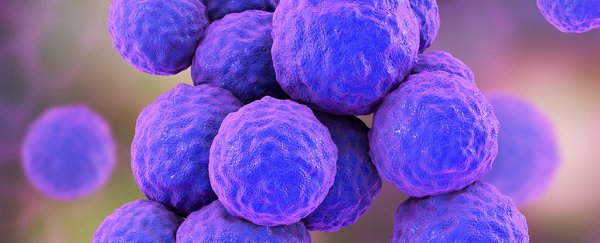As scientists look for new ways to tackle the growing problem of drug-resistant bacteria that evolve to resist our strongest medicines, they've hit upon a new strategy: using modern-day drug analysis to re-evaluate antibiotics overlooked in the past.
One such antibiotic is octapeptin, discovered 40 years ago but largely unused since, forgotten by scientists as other drugs took priority. Now though, octapeptin could get recalled to the front line to take on the worst of the superbugs.
Based on a new study of the antibiotic and tests on animal models, an international team of researchers thinks octapeptin has the potential to replace colistin, one of the drugs of last resort that bacteria have slowly been able to outsmart.
"Octapeptins were discovered in the late 1970s but were not selected for development at the time, as there was an abundance of new antibiotics with thousands of people working in antibiotic research and development," says one of the researchers, Matt Cooper from the University of Queensland in Australia.
"Given the very few researchers left in this field now, and the sparse pipeline for new antibiotics, we've used modern drug discovery procedures to re-evaluate its effectiveness against superbugs."
Part of the work involved synthesising octapeptin while improving its effectiveness against bacteria that have grown extremely resistant to drugs.
As well as being structurally similar to colistin, scientists think it could be less toxic to the body during treatment, based on the new analysis.
And it's particularly well-suited to tackling a stubborn type of bacteria called gram-negative bacteria, responsible for conditions such as pneumonia, meningitis, bloodstream infections, and wound or surgical site infections.
"Gram-negative bacteria are harder to kill as disease organisms, because they have an extra membrane to penetrate that is often hidden by a capsule or slime layer which acts to camouflage them from drugs and our immune system," says Cooper.
"Octapeptin showed superior antimicrobial activity to colistin against extensively resistant gram-negative bacteria in early preclinical testing."
There's still a long way to go in the development and testing of this newly rediscovered antibiotic, but the researchers say it could lay the foundation for a new generation of antibiotics ready to fight life-threatening infections.
With only one new class of antibiotic launched into the market in the last 30 years, we could use some more reinforcements in the ongoing fight against drug resistance.
Despite some promising research in recent years, there's no doubt it's the superbugs that have the upper hand at the moment, until we can figure out new angles of attack. Some estimates say drug-resistant infections could account for 10 million lives a year by 2050, up from 700,000 worldwide today.
"While this research is in the early stage, the rediscovery and optimisation of a forgotten drug is one way to fight back against the worst types of drug-resistant bacteria," Cooper said in October when work on the study began.
"We hope that this, and similar activities in other labs, could help to repair the broken antibiotic pipeline."
The research has been published in Cell Chemical Biology.
